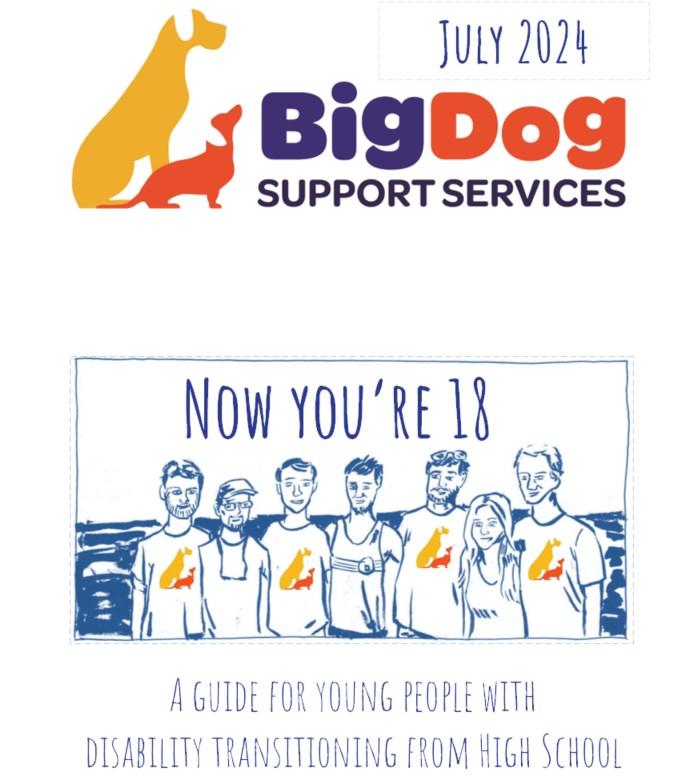
















































Preparing school leavers with the knowledge, skills and confidence to participate successfully in the community and the economy is essential to securing young people's future and the future of Queensland.
Careful planning and preparation helps ensure a smooth transition into employment, further education, vocational training and life in the community.
This guide is designed to give young people an overview of the supports available through government agencies and the community. As a live document it contains links to websites, Facebook, Twitter and other online pages.

Steven Paull JP (Qual) Director BigDog
More than ever, there is a need to empower young men and women living with a disability.
Ensuring that they are informed and prepared will help them seize opportunities at high school and ultimately prepare them for life beyond school in the broader community.
The Guide is well researched and connects students with a range of services and resources that will make a difference to their lives.
Every student should have the opportunity to work towards their heart-felt desires and aspirations –and this Guide is an important step to helping them get there.

David Janetzki MP Queensland Treasurer
At 18 you are now in control of your life. The law says you are an adult and you don’t need your parents’ permission to do anything.
• you can be taken to the adult courts if you break the law
• you can be sent to an adult jail for an offence
• you can buy alcohol and go to a public bar
• you can buy cigarettes
• you can be held responsible for any agreement you make (for example, if you borrow money, rent a flat, sign any contract)
• you can get married without anyone’s permission
• you can get a tattoo
• you can make a valid will
• you can buy a can of spray paint
• you can change your name without anyone’s permission
• you can have your genitalia including the nipples pierced
• you can apply for an Australian passport without your parent’s consent
• you can now engage in consensual sexting if all of the people involved are 18 or over
It is an offence to be drunk in a public place. Using obscene or insulting language or behaving violently, disorderly or indecently is also an offence. These offences are called public nuisance offences. It is also an offence to be drunk or disorderly in a licensed place (such as a bar or a club). If you are acting drunk, creating a disturbance or enter without being allowed then the club may ask you to leave. They can use force that is reasonable and necessary if you fail to leave when asked.
You can be charged with a drug offence if you:
• have possession of a dangerous drug on you, in your pocket or room, in a locker where you have the only key, in a bag that you give to a friend
• have possession of property (other than a syringe or needle – if stored/disposed of properly), which police believe is to be used to commit a drug offence.
• supply a dangerous drug
• produce a dangerous drug
• Are trafficking a dangerous drug

Income and Finance
Access to income and financial supports
Employment
Training and help to find a job
Aids and equipment
Technology to make everyday activities easier
Health and wellbeing
Support and services for your health and wellbeing
Everyday living
Help with the things you need to do every day
Education
Access to educational opportunities at all stages of life
Housing Information to help you find a home
Leisure
Access to sport, recreation, travel and tourism
Transport
Help to get you where you want to go
Rights and Legal
Help with discrimination or legal problems
The Disability Gateway has information and services to help people with disability, their family, friends and carers, to find the support they need in Australia.
Further Information
www.disabilitygateway.gov.au/
tick
and record the date when this section was completed
The NDIS is Australia’s first national scheme for people with disability. It provides funding directly to individuals.

There are around 4.3 million Australians who have a disability. Within the next five years the NDIS will provide an estimated 500,000 Australians who have permanent and significant disability with funding for supports and services. For many people, it will be the first time they receive the disability support they need.
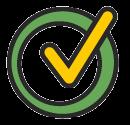
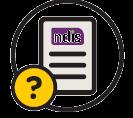
Go to the NDIS website and answer some simple questions to see if you may be able to apply for the NDIS. These questions are just a guide, the final decision about eligibility is up to the NDIA.
If you meet the eligibility criteria you can ask to become a participant by completing an Access Request Form. If you are eligible for the NDIS you will receive an “access decision” letter and the next step is creating your NDIS plan.
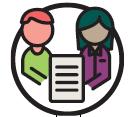
Your plan is a written agreement worked out with you. Everyone's plan is different. The NDIS will ask questions about how you are going in different areas of your life, what goals you would like to pursue and what kind of help and support you need. This will help them to develop a plan that provides the right support for you.

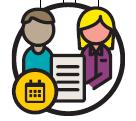
Once you have your plan, there are people who will help you start it, find out different types of budgets, and how to use the myplace portal.
Your plan review is the opportunity to check your supports are working for you and they are helping you pursue your
When it comes to accessing NDIS funding, it’s important to know about the different NDIS support categories and what kind of help they can offer.
The first batch of NDIS support categories are classified as core supports. These services assist you as an NDIS participant in being able to complete daily living activities, as well as help you work towards your individual NDIS goals.
The second of the NDIS support categories is capital. These supports relate to any investments that you need to make to assist you in daily life.
Most of the NDIS support categories are classified as capacity building activities. This relates to any support or services that helps you build skills that will enable you to live as independently as possible.
Partners in the Community employ LACs. For most people an LAC will be their main point of contact for the NDIS. An LAC will connect people to supports, services, activities in their community and other government services. LACs also work in communities to help them become more accessible and inclusive for all people with disability.
A Support Coordinator can help implement your plan and build your ability to connect with supports and services. Your NDIS Planner may also consider a Support Coordinator if your situation is more complex or you have specific goals you need help to achieve.
The NDIS Commission works with NDIS participants, NDIS providers and the community to uphold the rights of people with disability and build the capacity of providers to deliver safe and quality services and supports.
The NDIS Commission operates a new, nationally consistent system to safeguard the rights of NDIS participants, and will achieve this by working with people with disability, providers and the community.
NDIS Commission is responsible for:
• registration and regulation of NDIS providers, including through the new NDIS Practice Standards and an NDIS Code of Conduct
• Compliance monitoring, investigation and enforcement action
• Responding to concerns, complaints and reportable incidents, including abuse and neglect of a person with disability
• National oversight of behaviour support, including monitoring the use of restrictive practices within the NDIS with the aim of
reducing and eliminating such practices
• Leading the work with states and territories to design and implement nationally consistent NDIS worker screening
• Facilitating information sharing arrangements with the National Disability Insurance Agency (NDIA), State and Territory and other Commonwealth regulatory bodies.
It’s OK to complain – speaking up can help to improve services for you and other people. You have the right to raise a concern about NDIS supports if you are not happy. NDIS Commission will work with you, and with providers and workers, to resolve problems and improve the quality and safety of NDIS supports – for you and other participants.
1800 035 554
www.ndiscommission.gov.au/
The Code of Conduct requires workers and providers who deliver NDIS supports to:

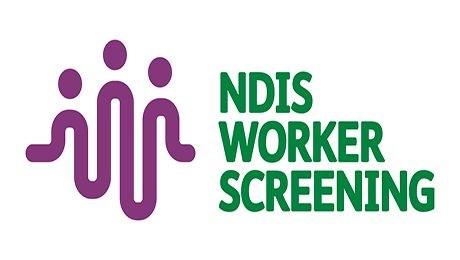



Act with respect for individual rights to freedom of expression, self-determination and decision-making in accordance with applicable laws and conventions
Respect the privacy of people with disability
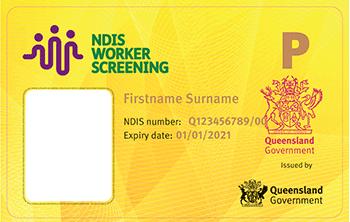

Provide supports and services in a safe and competent manner, with care and skill
Act with integrity, honesty and transparency

Promptly take steps to raise and act on concerns about matters that may impact the quality and safety of supports and services provided to people with disability

Take all reasonable steps to prevent and respond to all forms of violence against, and exploitation, neglect and abuse of, people with disability
Take all reasonable steps to prevent and respond to sexual misconduct
The NDIS Worker Screening Check is an assessment of whether a person who works, or seeks to work, with people with disability poses a risk to them. The assessment determines whether a person is cleared or excluded from working in certain roles with people with disability.
The NDIS Worker Screening Check is conducted by the Worker Screening Unit in the state or territory where a person applies for it. The Worker Screening Unit also decides whether a person is cleared or excluded. Registered NDIS providers are required to ensure that they only engage workers who have been cleared in certain roles, called risk assessed roles and include management positions with a registered provider and those delivering NDIS supports or services.
If you had tax taken from any income you received during the financial year from 1st July to 30th June, you need to lodge a tax return.
If you’re lodging your own tax return it is due by the 31st October.
MyTax is the quick, easy, safe and secure way to lodge your tax return online. It's web-based, so you don't need to download anything. And is accessed through your myGov account.
You can use a registered tax agent to prepare and lodge your tax return. Registered tax agents are the only people allowed to charge a fee to prepare and lodge your tax return.
When completing your tax return, you're entitled to claim deductions for some expenses related to your work.
myDeductions is a record-keeping tool to make it easier and more convenient for you to keep track of your records all in one place. You can upload your completed records to the ATO from the myDeductions tool and pre-fill your myTax return.
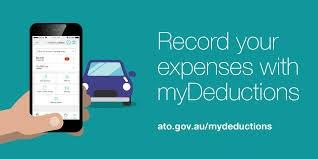
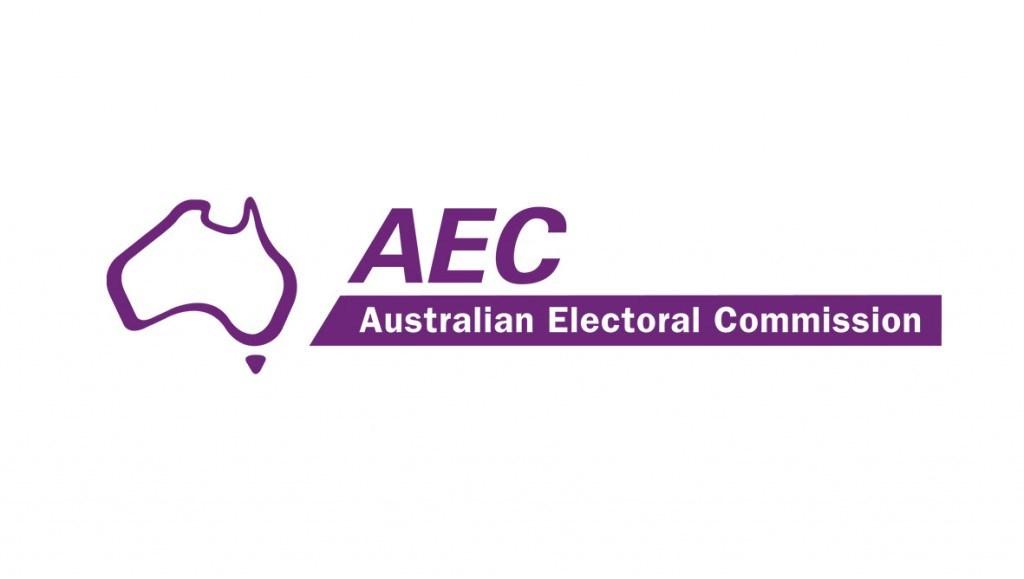
and vote in federal elections, byelections and referendums.
The AEC provides assistance for people living with disability to ensure they are not disadvantaged from participating in the electoral system.
The AEC can assist you to enrol, vote and help you find more information. It is compulsory for all eligible Australians to enrol and vote in federal elections and referendums.
Shortly after an election is announced, an official guide is made available to all Australians. It provides information on when and where to vote, assistance available at polling places and how to vote correctly.
Do you have to enrol if you have a disability?
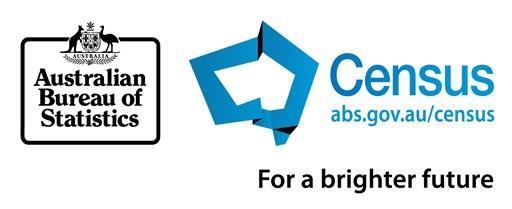
Every five years, the Australian Bureau of Statistics counts every person and household in Australia.
The Census is the most comprehensive snapshot of the country and tells the story of how we are changing. It includes around 10 million households and over 25 million people.
Census data tells us about the economic, social and cultural make -up of the country.
The Census is compulsory.
Everyone who is staying in your household on Census night must be included.
Yes, you are required by law to enrol and vote in federal elections and referendums. Further Information
13 23 26 www.aec.gov.au/ www.abs.gov.au/census
Put a tick the box and record the date when this section was completed
The Australian Securities and Investments Commission (ASIC) regulates financial services in Australia.
Credit cards let you carry less cash and buy things over the phone or online. But this convenience comes at a cost if you spend more than you can repay. Most credit cards have an annual fee.
Credit cards tend to have higher interest rates than other types of credit, and the rate can vary depending on what features the card offers. You will be charged interest on all outstanding transactions if you don't repay the amount you owe each month.
Remember to check your credit card statements carefully to make sure you are being charged correctly.
A credit card can be handy if used wisely but they can also lead to
A debit card offers all the convenience of making payments with a card, without the pain of credit debts.
When you use a debit card, it takes money from your account to pay for purchases. If there is no money in your account, you can't make the purchase.
The most common type of debit card is an ATM (automated teller machine) or EFTPOS card. This card is used to withdraw money at ATMs and make purchases. You may have to provide a personal identification number (PIN) before you can withdraw money or make a purchase.
The OPG is an independent statutory office established to protect the rights, interests and wellbeing of adults with impaired decisionmaking capacity, and children and young people in the child protection system. This includes those in out-of-home care, such as a foster home, the home of a kinship carer, a residential care facility, a youth detention or adult correctional centre, disability service or mental health facility.
The Public Guardian Act 2014 and Guardianship and Administration Act 2000 set out the OPG’s legislative functions, obligations and powers. The Powers of Attorney Act 1998 regulates the authority for adults to appoint substitute decision-makers under an Advanced Health Directive or an Enduring Power of Attorney.
The PT is a self-funding statutory authority that reports through the State’s Attorney-General.
It delivers a range of services including: enduring powers of attorney; free Will making and financial administration for people with decision making impairment.
QCAT is an independent, accessible tribunal that efficiently resolves disputes on a range of matters.
The tribunal’s purpose is to provide a quick, inexpensive avenue to resolve disputes between parties and make decisions.
Further Information
1300 653 187
* publicguardian@publicguardian.qld.gov.au www.publicguardian.qld.gov.au/
Further Information
1300 651 591
* clientenq@pt.qld.gov.au
www.pt.qld.gov.au
Put a tick the box and record the date when this section was completed
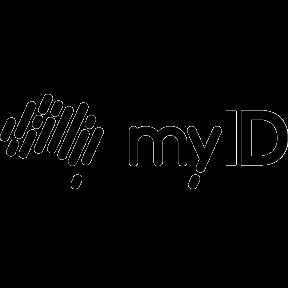
myID is a secure way to access government services online with one login and one password. myID Inbox will keep your letters, statements and messages safe, secure and in the one place.
You can update your address and contact details in your myID account and your changes will also be made with your linked member services.
You are responsible for your myID account and making sure only you can access it. You must not allow someone else to sign-in or use your myID account.
You must keep your myID password, myID PIN and your selected secret questions and answers safe. Do not share these details with anyone else.
You can choose to receive myID Inbox message notifications via myID app, text or email.
• Australian JobSearch
• Australian Taxation Office
• Business Registration Service
• Centrelink
• Child Support
• Department of Veterans' Affairs
• Director ID
• Medicare
• My Aged Care
• My Health Record
• National Disability Insurance Scheme
• National Redress Scheme
• State Revenue Office Victoria
You must have an email address that is not shared by another person to open a myID account.
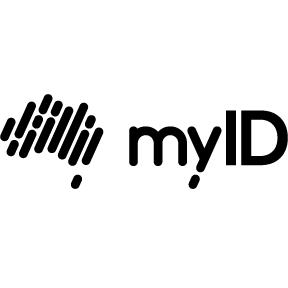

Centrelink will give you a Customer Reference Number (CRN) when you get payments and services from them.
Rent Assistance is a non-taxable income supplement payable to eligible people who rent in the private rental market or community housing.
This lets you pay your public housing rent straight from your Centrelink payments. You can arrange this with your state or territory housing authority. It’s a free service.
A quarterly payment to help with household bills if you get a DSP and are under 21 years of age with no dependent children.
A quarterly payment to help with phone and internet costs
• Express Plus App
• Disability Support Pension
• Medical Rules
• Non-medical Rules
• Youth Disability Supplement
• Program of Support
• Disability Employment Services
• Youth Allowance
• Mobility Allowance
• Centrepay
• Financial Information Service
• Crisis Payment
• Sickness Allowance
• Special Disability Trusts
• Payment and Service Finder
Financial help if you’re 18 to 24 and a student studying full time or an Australian Apprentice.
For full time students and Australian Apprentices aged 25 or older. The amount of Austudy you get depends on how much you earn and how much your assets are worth.
Aboriginal or Torres Strait Islanders who are studying or undertaking an Australian Apprenticeship.
Helps with travel costs between your permanent home and your place of tertiary study in Australia.
A voluntary loan you can get up to twice a year if you’re an eligible higher education student.
If you still meet the Disability Support Pension medical rules
An assessment of the impact of your disability, illness, injury or other barriers to work.
Your assessor will talk to you about:
• any barriers to work you may have, including any medical conditions
• any recent help or rehabilitation you’ve had, and
• services to help you find and keep a job, if needed
Financial help if you’re 21 or younger and looking for work, or temporarily unable to work.

Thousands of jobs are advertised on WorkforceAustralia.gov.au webs ite every day. One of them could be yours. Create Your account and start applying for jobs today. With Your account, you can:
• create your profile
• upload and share your resume with employers
• set up job alerts
• search and apply for jobs through the Workforce Australia website.

Whether you’re starting out or looking for a change, Your Career is a digital platform that can help you with your career needs and goals.
• Get career ideas.
• Learn skills and train.
• Career advice and support.
Employment services providers can help you look for work and develop your skills to get job-ready.
Local Jobs Program addresses employment and skills needs at the local level across 51 employment regions. And eligible individuals can participate in activities funded through the Local Recovery Fund.
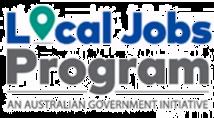

JobAccess is the national hub for workplace and employment information for people with disability, employers and service providers.
Through Disability Employment Services (DES), eligible people with disability, injury or health condition can receive help to prepare for, find and keep a job. Help can include career advice, employment preparation, resume development, and training.
You can also get help with job searching and ongoing support at work including funding for necessary workplace modifications and wage subsidies to employers.

ADEs are generally not for profit organisations providing supported employment opportunities to people with disability. ADEs provide a wide range of employment opportunities and they operate within a commercial context.
An ADE supports people with disability to engage in a wide variety of work tasks such as packaging, assembly, production, recycling, plant nursery, garden maintenance and landscaping, cleaning and laundry services and food services. ADEs also offer similar working conditions as other employers and an opportunity for people with a disability to contribute and connect to their local community.
Further Information
1800 464 800
https://www.jobaccess.gov.au
Further Information
https://www.dss.gov.au/disability-andcarers-programmes-services-forpeople-with-disability/australiandisability-enterprises
Put a tick the box and record the date when this section was completed
The internet is a great way to keep in touch with your friends and meet new people. However, it’s important to be careful about who you talk to, what information you post and the things you say to other people and about other people.
Privacy issues arise almost every day. They have become more prevalent with the growth and use of technology in our everyday life. Even sharing the most basic information about yourself online, may put your privacy at risk.
There are lots of choices when deciding to get a phone. The most important step is deciding how much money you have to get a new phone and be able to afford to keep it running. If you’re thinking about going onto a mobile phone plan don’t feel pressured to sign it on the spot. It’s OK to shop around, ask lots of questions and talk to your parents or another adult before signing up.

IDCARE responds to many types of identity and cyber security concerns including:
• Lost or stolen credentials
• Remote access of your device
• Scams
• Email phishing attacks
• Hacking of social media or email
• Mobile phone porting
• Unauthorised access to your bank, credit card or superannuation accounts
• Bank, phone or other utility accounts opened in your name
• Credit report inaccuracies
IDCARE services are free of charge
a tick the box and record the date when this section was completed
NEIS training can help you achieve a nationally recognised small business qualification. During the training your NEIS provider will help you to develop a NEIS Business Plan
Your NEIS provider will refer you to the appropriate training taking into account your business idea. This will be either a:
• Certificate III in Entrepreneurship and New Business or
• Certificate IV in Entrepreneurship and New Business.
NEIS Training is a Services Australia approved activity for up to 13 weeks. This means that people receiving certain types of income support (such as JobSeeker Payment) are not required to look for work while undertaking their small business training.

The Australian Government’s ultimate hub for careers information. It doesn’t matter what age or stage you’re at, it’s never too late to plan and manage your career! You’ll find information on industries, occupations, vocational education and training, and more. Discover a career that's right for you and learn about the steps to help get you there.
• Higher Education
• Vocational Education and Training
• VET training courses
• VET training providers
• VET alumni ambassadors
• Course Seeker
The Fair Work Ombudsman, is an independent statutory agency of the Government of Australia that serves as the central point of contact for free advice and information on the Australian national workplace relations system as set by the Fair Work Act 2009.
• Provide education, assistance, advice and guidance to employers, employees, outworkers, outworker entities and organisations.
• Promote and monitor compliance with workplace laws.
• Inquire into and investigate breaches of the Fair Work Act.
• Take enforcement action.
• Perform our statutory functions efficiently, effectively, economically and ethically.
• Penalty Rates and Allowances
• Minimum Wages
• Types of Employees
• Awards and Agreements
• Penalty Rates and Allowances
• Tax and Superannuation
• Annual Leave
• Pay Slips and Record-keeping
• Protections at work
• Unpaid Work
• Unfair dismissal
• Redundancy
• Ending Employment
• Bullying and Harassment
• Workers Compensation
Further Information
13 13 94
www.fairwork.gov.au/
The Supported Wage System (SWS) applies to employees with disability and who have a reduced work capacity.
The Department of Social Services gives out information and advice about who is eligible for the SWS. It also accepts applications for the SWS and can deal with disputes.
a tick the box and record the date when this section was completed
The Queensland Government’s traditional role in disability services changed as a result of the signing of the full scheme NDIS bi-lateral agreement.
Their role has shifted to supporting and advocating for people with disability, working in partnership with the disability sector to create an all-abilities Queensland and monitoring the NDIS to ensure it delivers the outcomes we all expect for Queenslanders with disability.
To ensure they can provide the oversight and advocacy required, they have created Disability, Seniors and Carers (DSC) which is made up of a team of people who will deliver on the sector's strongest demand – nothing about us without us.
Through DSC, they can ensure NDIS clients are treated with respect and dignity, have control of the services they receive and have opportunities for social and economic participation.
A key strategy of DSC will be to seek and consider the lived experi-
ence and views of people with disability, their families, carers and the sector, as we all continue to build a more inclusive and accessible Queensland.
We all want Queenslanders with disability and their families to be able to take advantage of the full range of social and economic opportunities available in our great State.
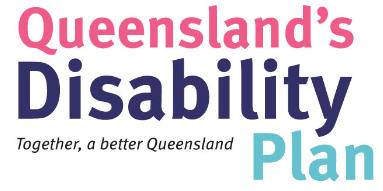
In Now you’re 16
• All Abilities Queensland
• Queensland Community Support Scheme (QCCS)
• Carer Business Discount Card
• Companion Card
Further Information
13 QGOV (13 74 68)
1300 735 874 Accommodation www.dcssds.qld.gov.au
Put a tick the box and record the date when this section was completed
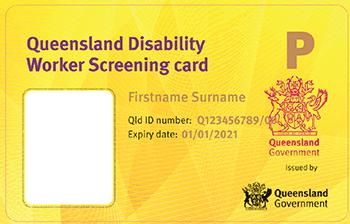
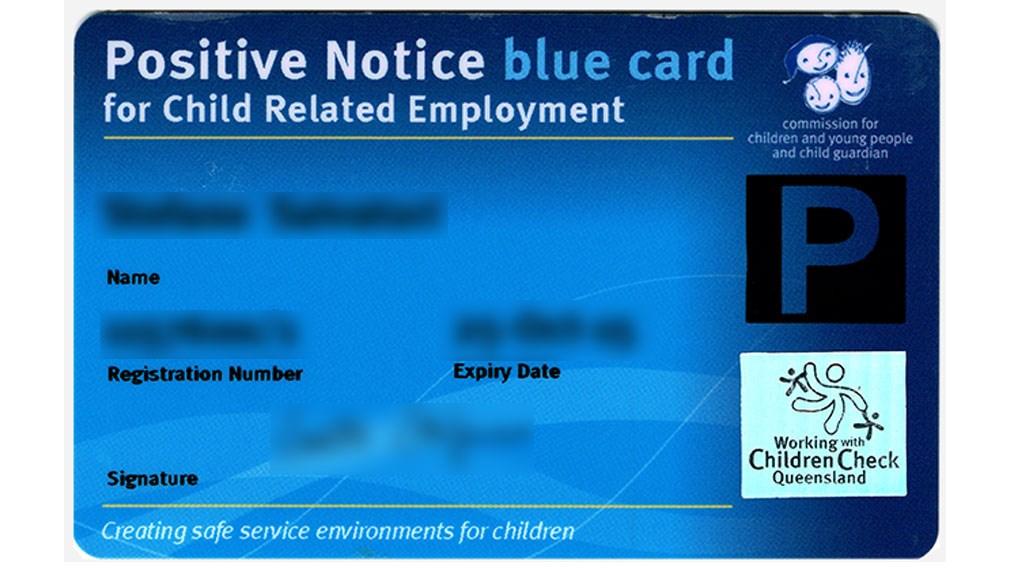
Workers in roles who are newly engaged by a state-funded provider to provide disability supports and services must undergo a Queensland disability worker screening check. This includes workers in the Queensland Government run Accommodation Support and Respite Services and Queensland Government funded disability advocacy services. If you have a valid yellow card you can keep using it until it expires, suspended or cancelled
Blue Card Services administers the blue card system - Queensland’s Working with Children Check.
The blue card system regulates activities that are essential to children’s lives.
These include childcare, education, sport, cultural activities and foster care.
Blue Card checks and monitors people who work in these industries and help organisations to create safe environments for children.

Higher education courses can be taken to earn an advanced degree and continue your studies. There are three main types of higher education which lead to Bachelor, Master and Doctoral Degrees. It is quite common for students to enrol in a double or combined Bachelor Degree program which leads to the award of two Bachelor Degrees. This is most common in the fields of arts, commerce, law and science.
Australian institutions offer a wide range of courses – from science to management and commerce, humanities to engineering, and law to health sciences. Australian institutions rank among the world’s best by discipline, particularly in engineering and technology, medicine, environmental science, and accounting and finance.
There are 43 universities in Australia (40 Australian universities, two international universities, and one private specialty university). Along with these universities, many other institutions offer higher education courses.
Universities are committed to providing an equitable environment for students with disability, injury, mental health or medical condition that impacts on their ability to study and achieve academic success.
Once you are registered for disability support, a Student Equity Officer will coordinate the implementation of the reasonable adjustments and services determined during your interview. These will be outlined in your Learning Support Plan (LSP).
Further information about the different types of disability is available on the Australian Disability Clearinghouse on Education and Training website.
Further Information
www.adcet.edu.au/
Put a tick the box and record the date when this section was completed
TAFE Queensland has a pathway to help you begin your career or embark on further study. You can even get started while you're still at school with the TAFE at School program, or finish your high school studies at TAFE Senior College.
Tafe delivers practical, industryrelevant training across a range of industries from entry-level certificates to bachelor degrees, at more than 50 locations in Queensland.
To support Queensland's Year 12 graduates to successfully transition to employment, TAFE is offering fee-free training in high priority qualifications.
The training is available through a range of certificate III level vocational education and training (VET) courses as well as apprenticeships and traineeships.
Further Information
https://tafeqld.edu.au/
RTOs are those training providers registered by Australian Skills Quality Authority (ASQA) to deliver vocational education and training (VET) services.
RTOs are recognised as providers of quality-assured and nationally recognised training and qualifications.
RTOs offer students training and qualifications or statements of attainment that are recognised across Australia, and are accepted by industry and other educational institutions.
There are currently around 5000 RTOs in Australia. A complete list of RTOs is maintained at training.gov.au, the authoritative national register of the VET sector in Australia.
Further Information
1300 369 936
info@desbt.qld.gov.au
https://desbt.qld.gov.au/training/ apprentices
Put a tick the box and record the date when this section was completed
Queensland (WHSQ) monitors work health and safety in Queensland businesses.
WHSQ enforces work health and safety laws and conducts inspections and investigations to ensure employers and others are meeting their obligations.
• making reasonable adjustments to enable you to access their workplace
• employment specific aids and equipment such as computers and modified desks
• reasonable adjustments to buildings, such as installing ramps
• transportation for work activities, such as attending a meeting
Employers will continue to be responsible for making their workplaces accessible and providing you with all the employmentspecific tools and equipment you, the employee requires.
If an employer is responsible for a support, the NDIS cannot fund that support, even if the employer does not provide it.
Some organisations hire apprentices and trainees and place them with host employers. GTOs operate across Australia with some specialising in particular industries, while others cover many. GTOs complete employer duties, which include:
• selecting and recruiting apprentices and trainees
• paying wages, allowances, superannuation, workers compensation, sick/holiday pay and other employment benefits
• managing the quality and continuity of training, both on and off the job
• providing any care and support the apprentices needs to complete their training.
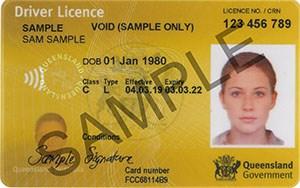
There are 2 types of provisional licences - P1 and P2. You need to hold your P1 licence for at least 1 year to be eligible to upgrade your licence to a P2 or open licence. You must be at least 20 years old to be eligible for an open driver licence.
In Now you’re 16
• Accessible Public Transport Standards
• Learner Licence
• Motorised Wheelchair
• Taxi Subsidy Scheme
• Disability Parking Permit
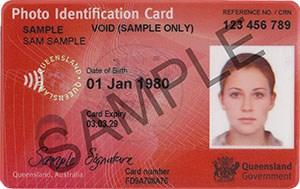
Is a form of photo identification for people who are not old enough to get a driver licence or don’t hold a driver licence or passport. It replaces the adult proof of age card which replaced the previous 18+ card.
Store and share your driver licence on your mobile devices.
Information
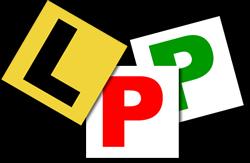
Put a tick the box and record the date when this section was completed
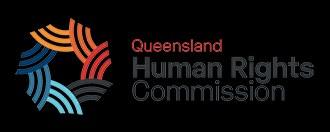
The Commission is an independent statutory body established under the Queensland AntiDiscrimination Act 1991. They were formerly the AntiDiscrimination Commission Queensland, and were renamed the Queensland Human Rights Commission on 1st July 2019. The Commission handles complaints and training on discrimination, vilification, victimisation and sexual harassment, and supports businesses, state and local government, the community sector and people throughout the state
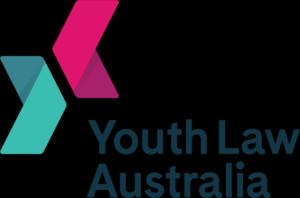
Youth Law Australia is a community legal service that is dedicated to helping young people and their supporters to find a legal solution to their problems.
Previously named the National Children’s and Youth Law Centre and known as Lawstuff, they are a technology-based community legal service dedicated to addressing the human rights abuses of young people in Australia. They believe in equality and justice for all young people, and they work to achieve this by connecting and empowering young Australians with free legal information and knowledge.
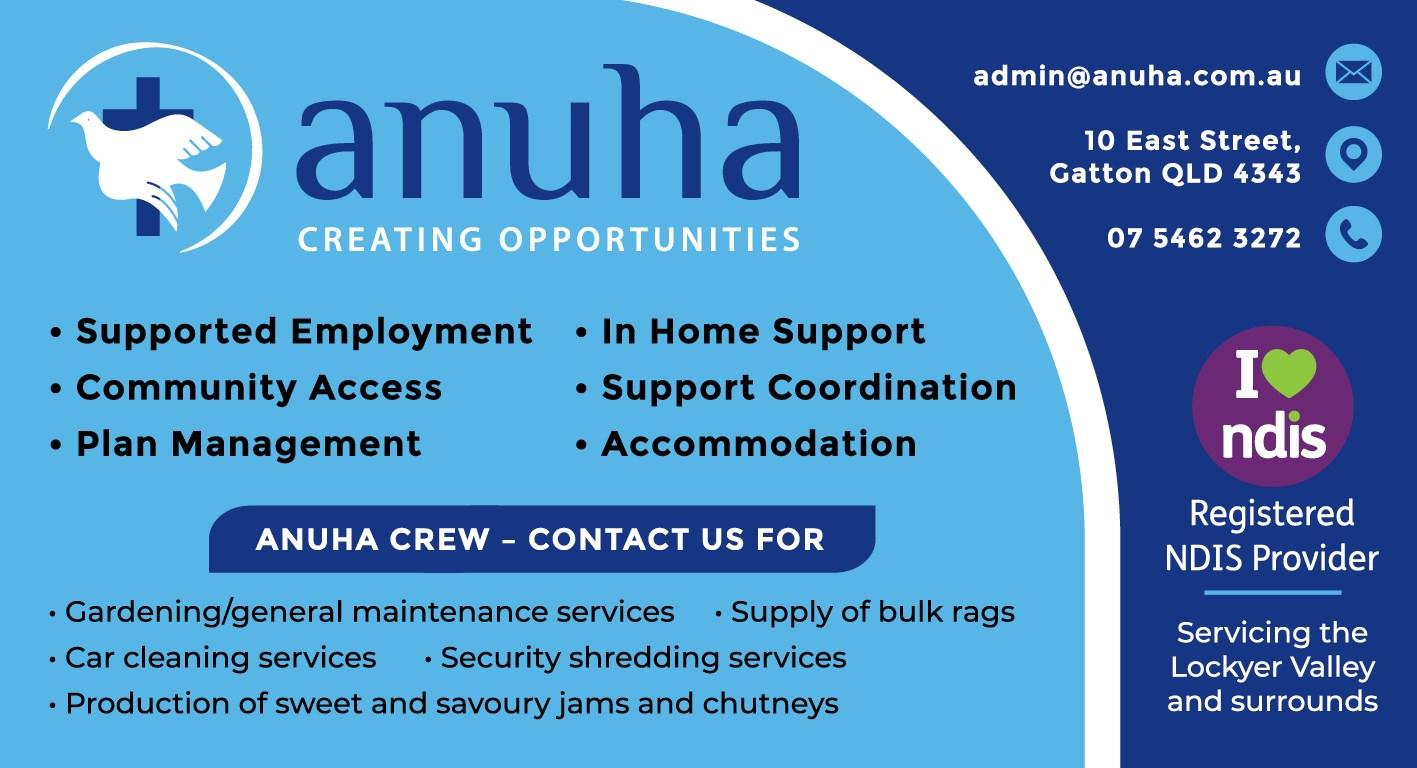
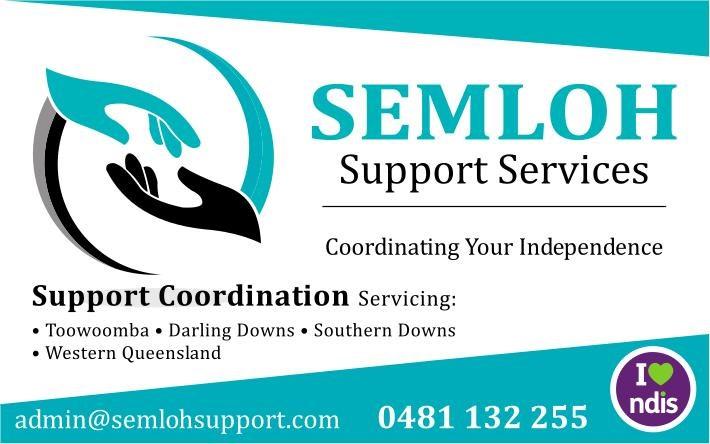
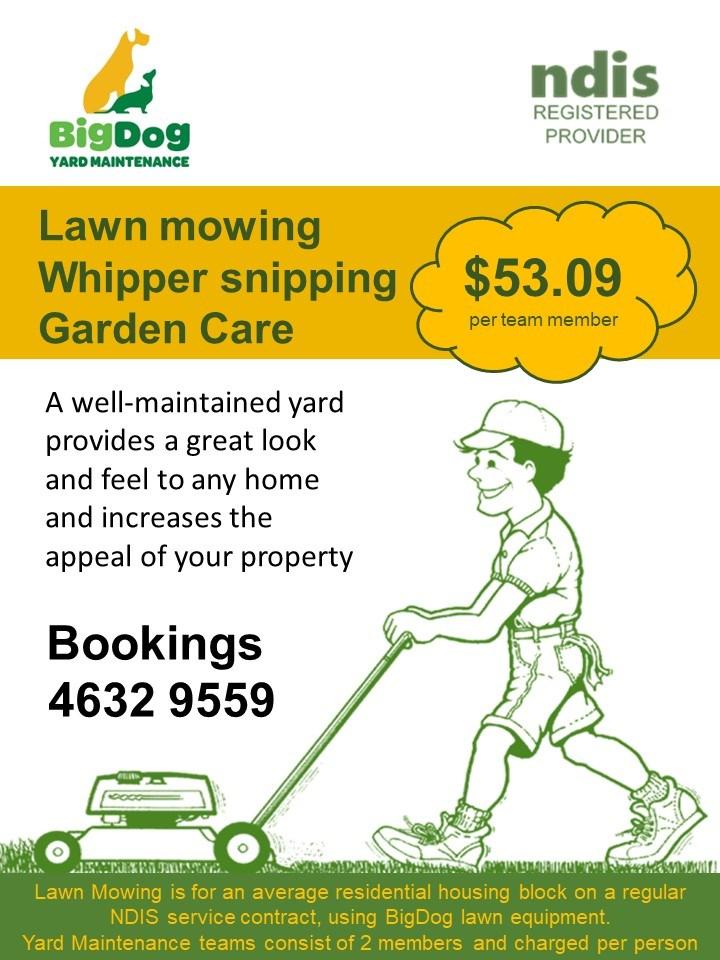

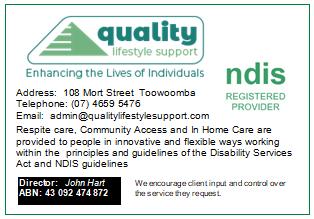
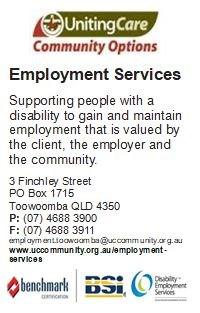
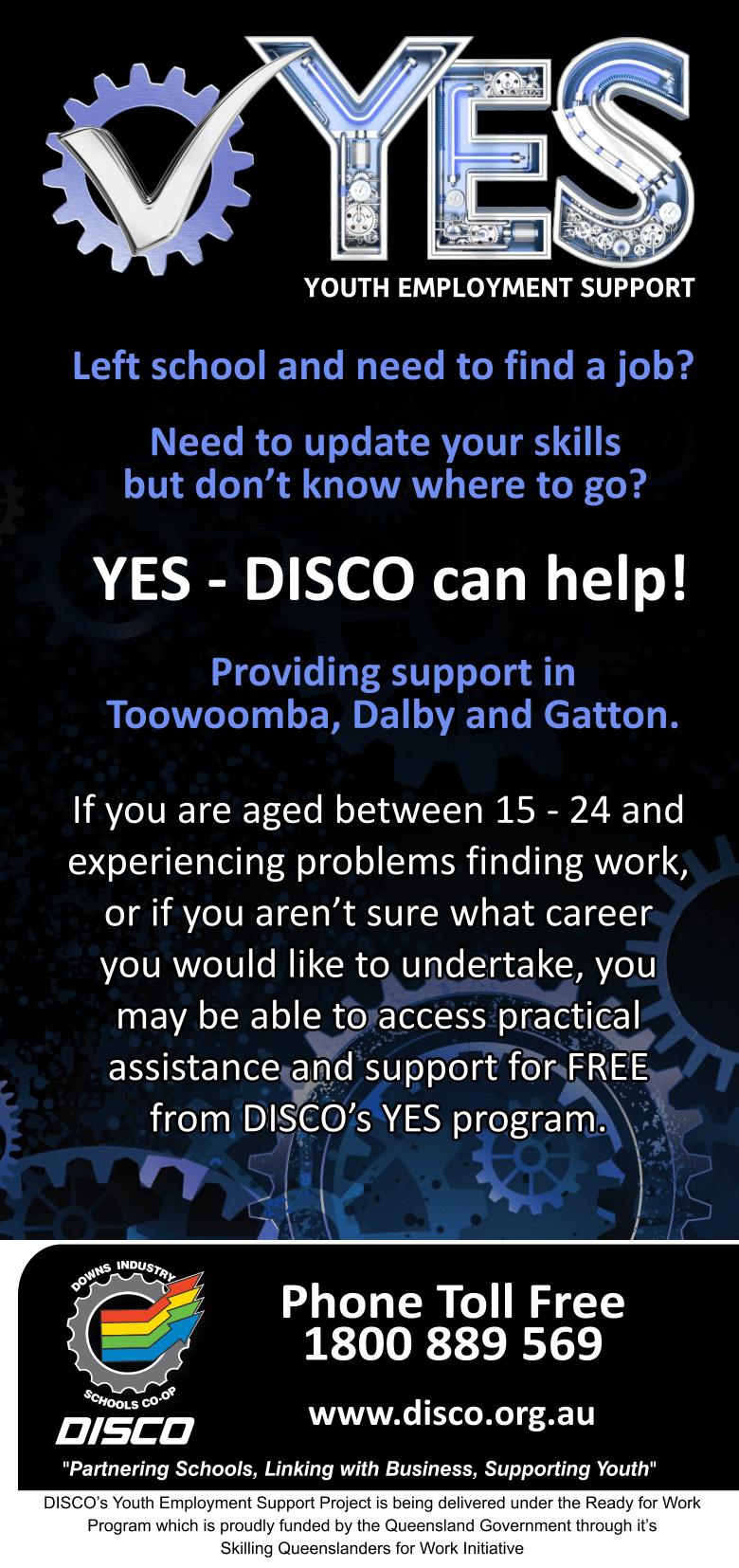
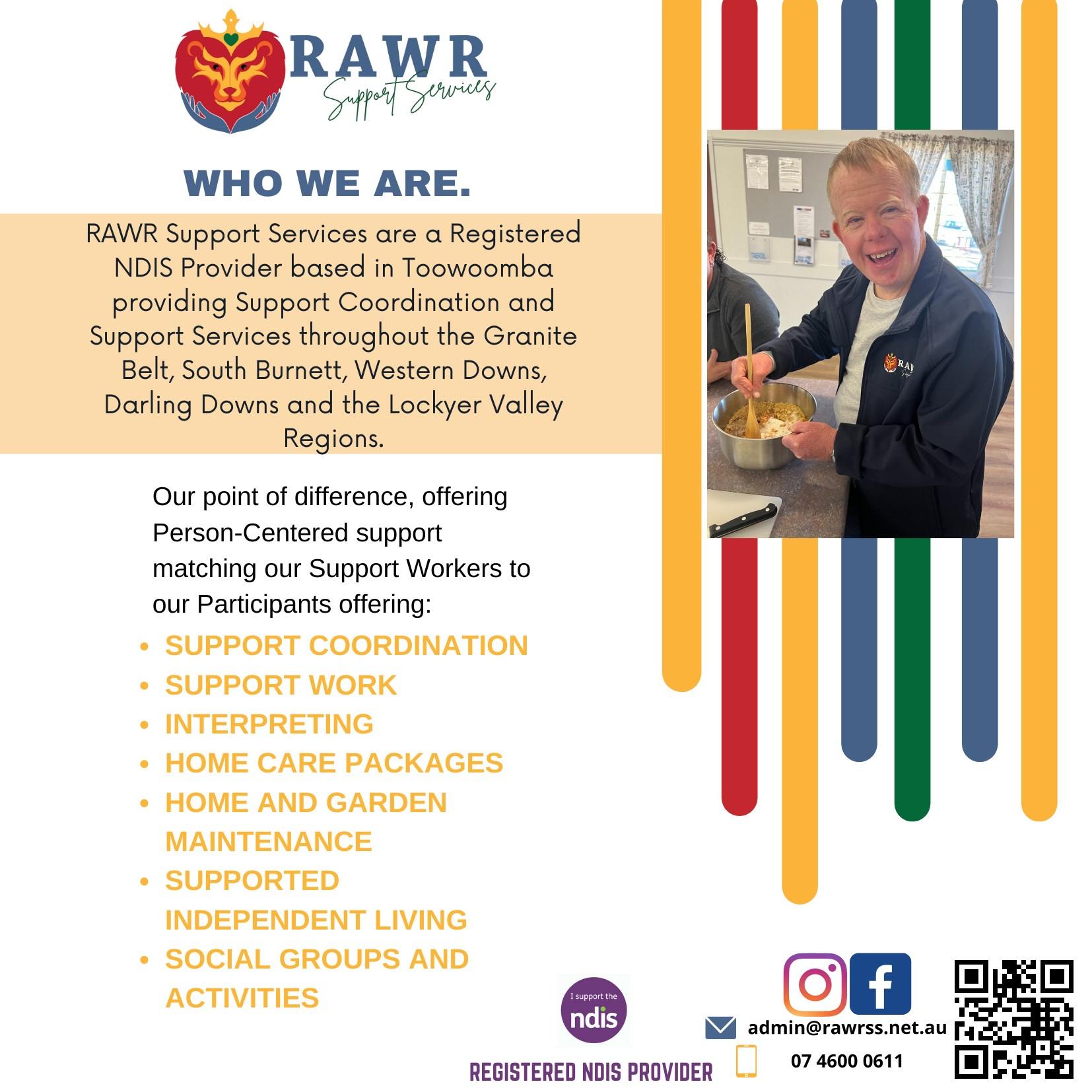


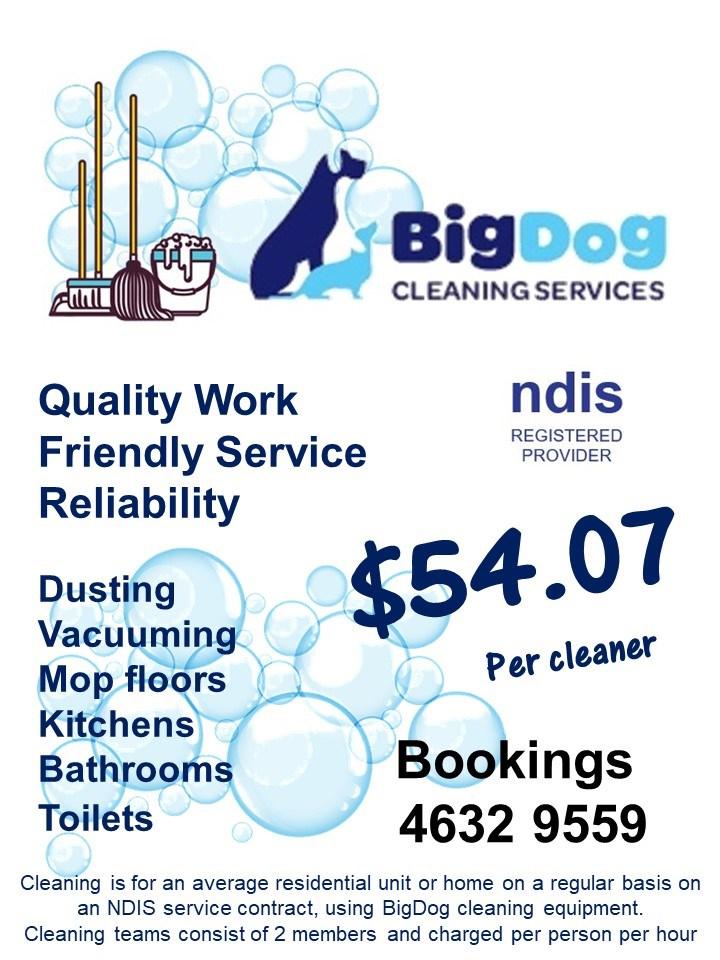



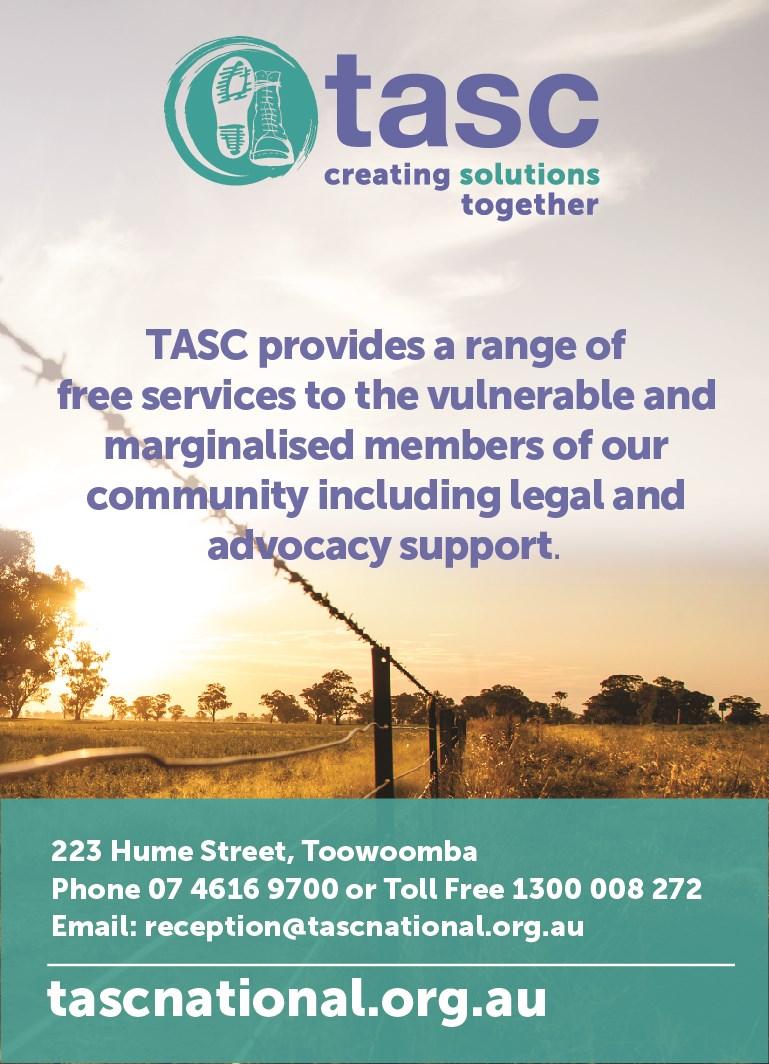
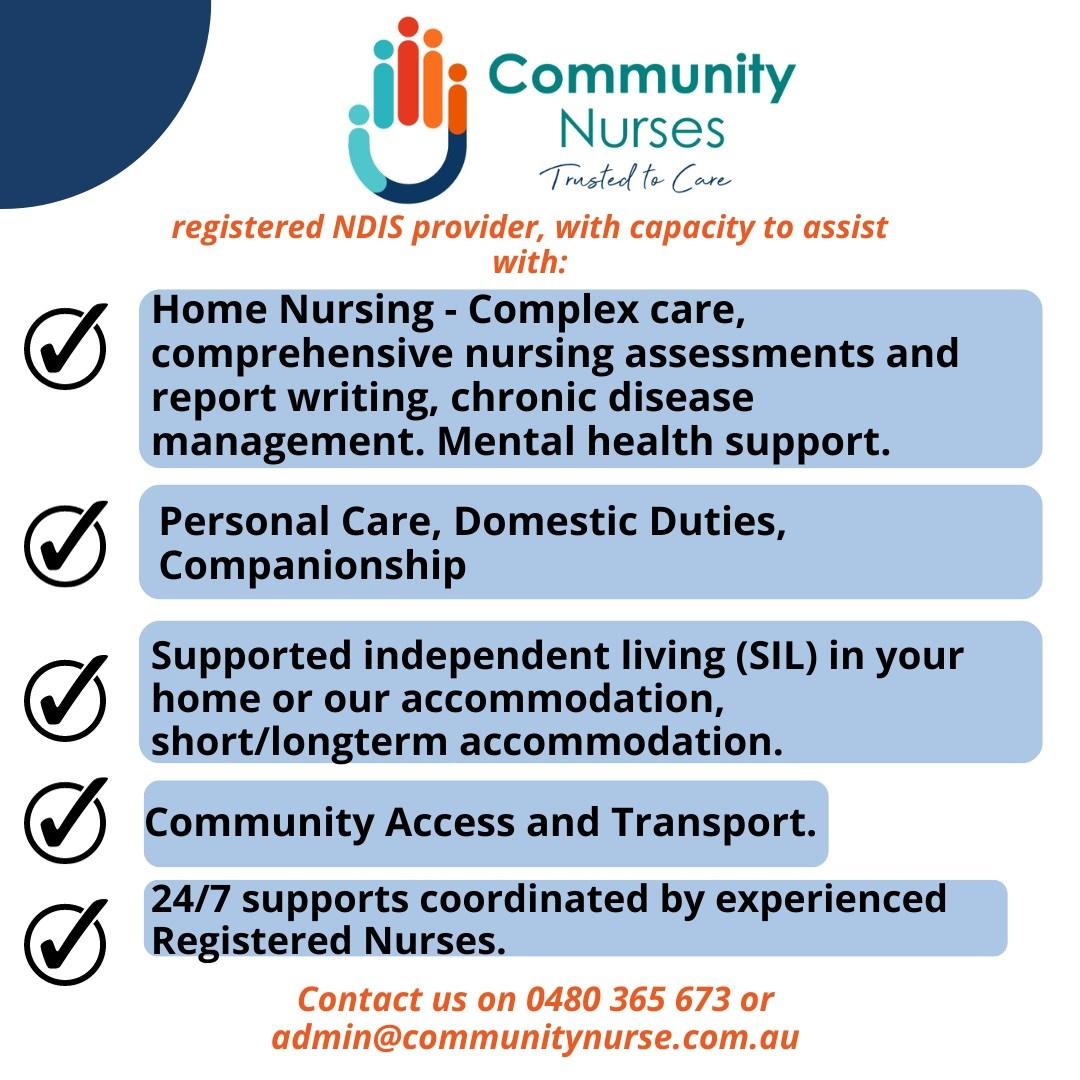

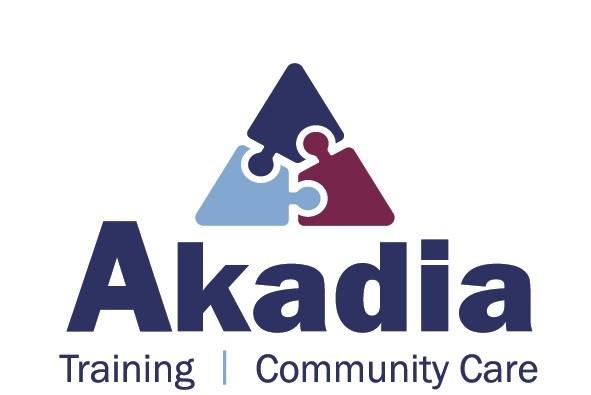
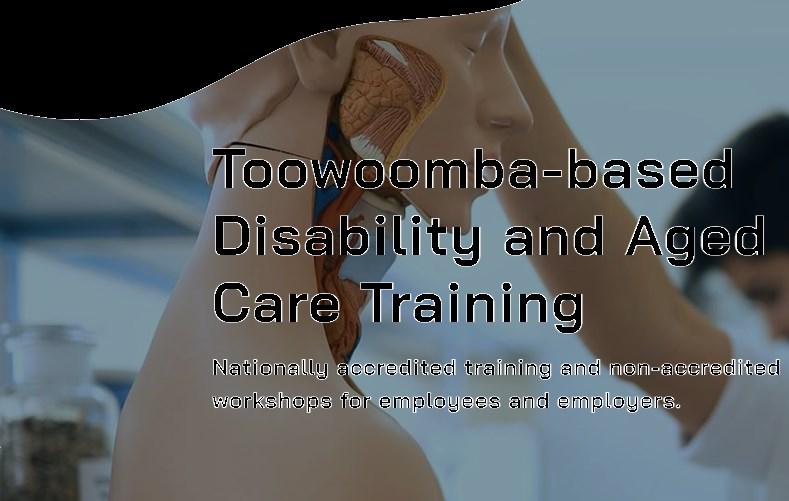
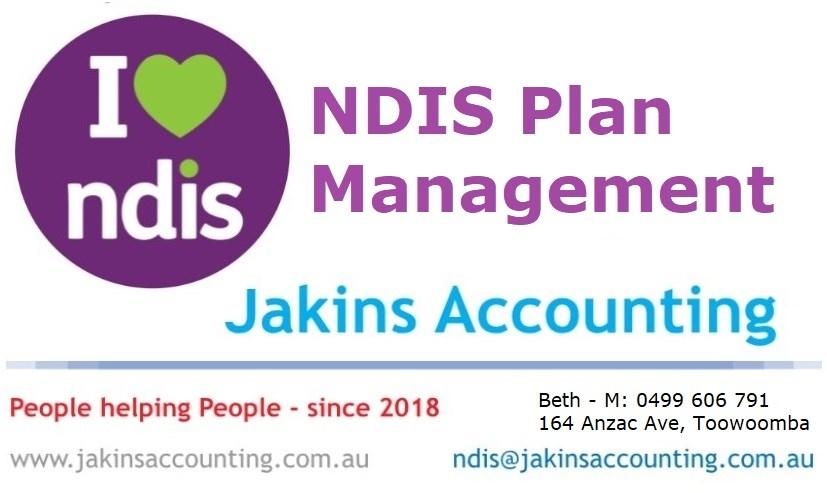
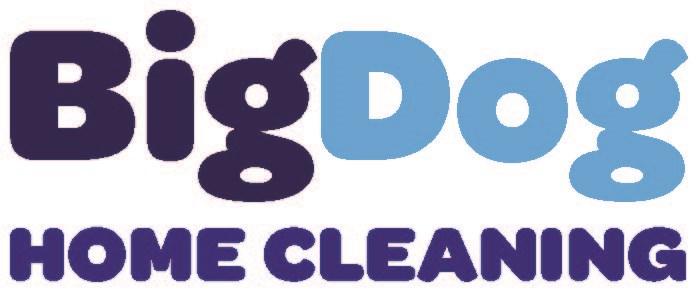


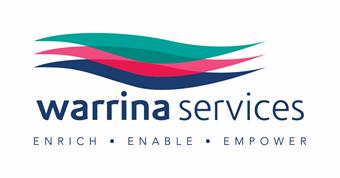
Warrina Services is a specialist support agency that has been providing individual support to people of the Darling Downs since 1986. We support people with a diverse range of needs and also provide mental health services to assist personal recovery.
We can help you to achieve positive outcomes in your life. These may be related to choice and independence, education or training, attending social activities, increasing skills, getting a job or contributing to your community.
If you would like further information please visit our website www.warrinaservices.org.au Or contact us
Phone: 07-46 380 399 Email: warrinas@warrinas.com.au or
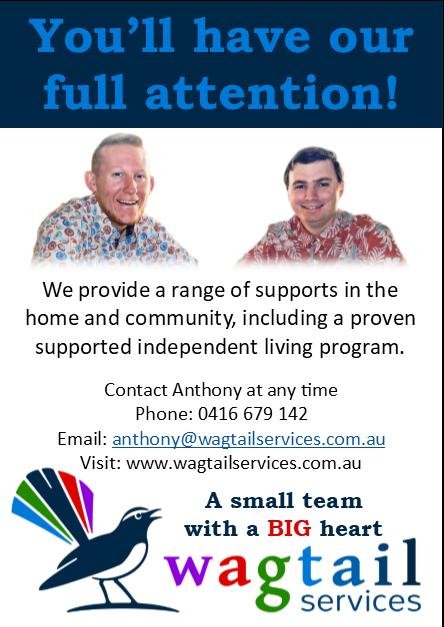
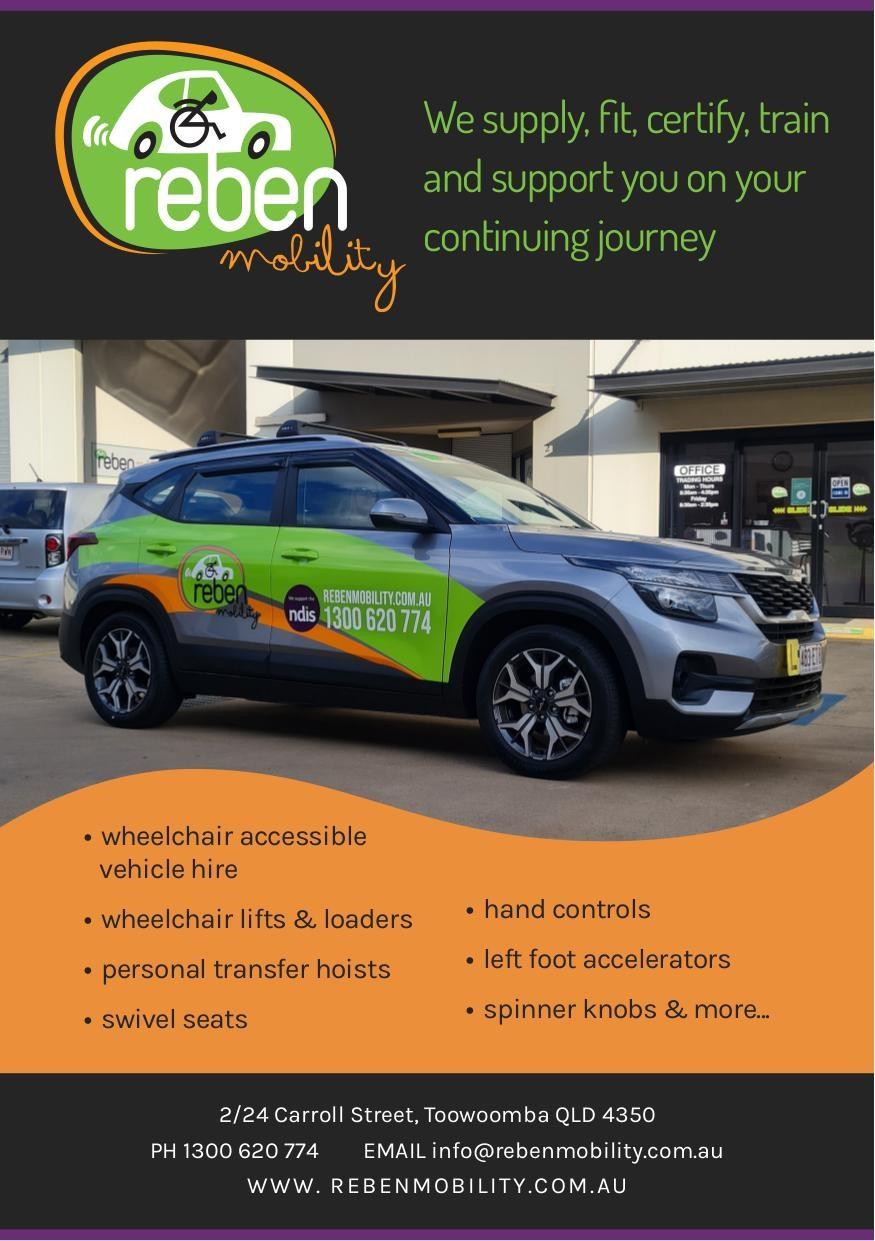
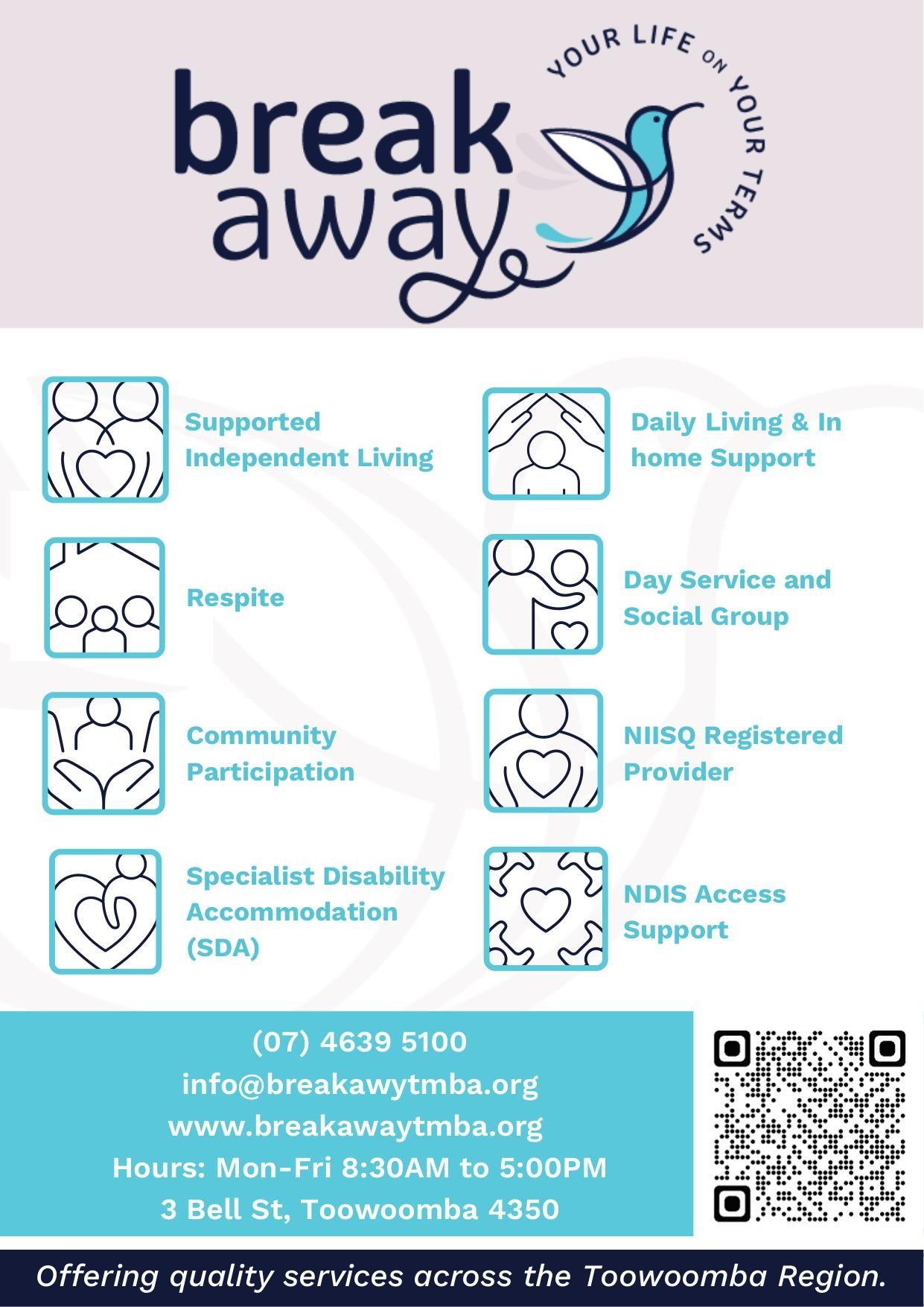
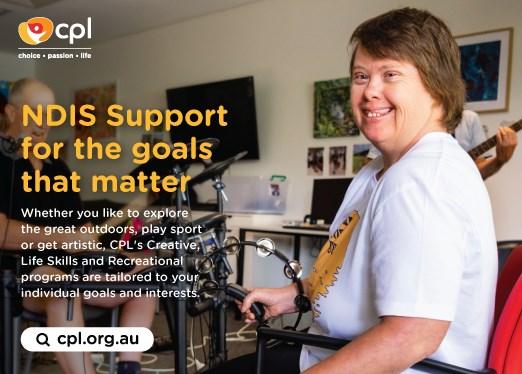

STEVEN PAULL President

COURTNEY CARROLL Editor

JESS
WRIGHT Secretary

ANN PAULL Treasurer
PUBLISHER: Disability Media Association Inc (Australia) (DMAA)
TELEPHONE: (07) 4632 9559
OFFICE: Paul Myatt Community Centre 11-15 Alexander Street Toowoomba (open Monday to Friday 9:00am-3:00 pm)
POSTAL ADDRESS: PO Box 3621 Toowoomba QLD 4350
E-MAIL: spaull@bigdogsupport.com.au
MANAGEMENT BOARD: Steven Paull (President) Courtney Carroll (Editor) Jess Wright (Secretary) Ann Paull (Treasurer)
CONTRIBUTORS: Bronwyn Herbertson, Sharon Boyce, Aidan Wilcock, Dean Gill, Jess Wright, Steven Paull and many others.
PUBLISHED
January/March/May/July/September/November
ABN: 72 821 350 911
PRINT POST APPROVED: PP 424022/ 1811
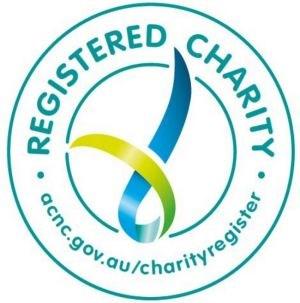
Articles and adverts reproduced on these pages are accepted and published in good faith. It is a condition of acceptance that advertisers and article writers accept full responsibility for their advertisements and articles, and will fully indemnify the producers in the event of any claims or legal proceedings against them. Articles published are not necessarily the view of the publishers. Advertisements are also accepted on the basis that they do not conflict with any discrimination laws or other laws currently in force.
ADVERTISING
Although we are a volunteer and non profit organisation, we are not funded in any way, and have to cover costs of this publication by charging for advertising. WhatsUp reserves the right to adjust, resize or move advertisements when necessary to allow for editing
1) SUBSCRIPTION (In advance) $20 per year (includes delivery/postage).
2) A single edition of WhatsUp can be bought at the office and selected outlets. You may also subscribe by using the form on the outside cover.
3) Reference copies are held in the Tourist Office and Toowoomba Library.
COPYRIGHT
Copyright Protected. All pages are subject to copyright law and may be copied only with the permission of WhatsUp. Copies are not to be used commercially or for profit or for personal financial gain. Permission may be granted to copy only if the purpose is to give it away to others for their personal interest but not to any other organisation or service.
All articles are accepted in good faith and are not necessarily the view of the Editorial team or Management. Articles are accepted on the understanding that in the event of any claims against WhatsUp, the writer of the article will take full responsibility and indemnify WhatsUp in the event of legislation against it. Articles are also accepted on the understanding that the contents do not breach any Disability laws or other legislation currently in use.
WhatsUp In Disability is provided as a Master Copy to individuals and organisations or to view online form our website. We are environmental friendly, we do not print any more copies than is absolutely necessary. We prefer and encourage the practice of passing the magazine from person to person or copying the whole magazine to pass on to others. Permission is needed to copy (see Copyright above) When copying the magazine we require that the pages be marked ‘copy’.
www.mycommunitydirectory.com.au
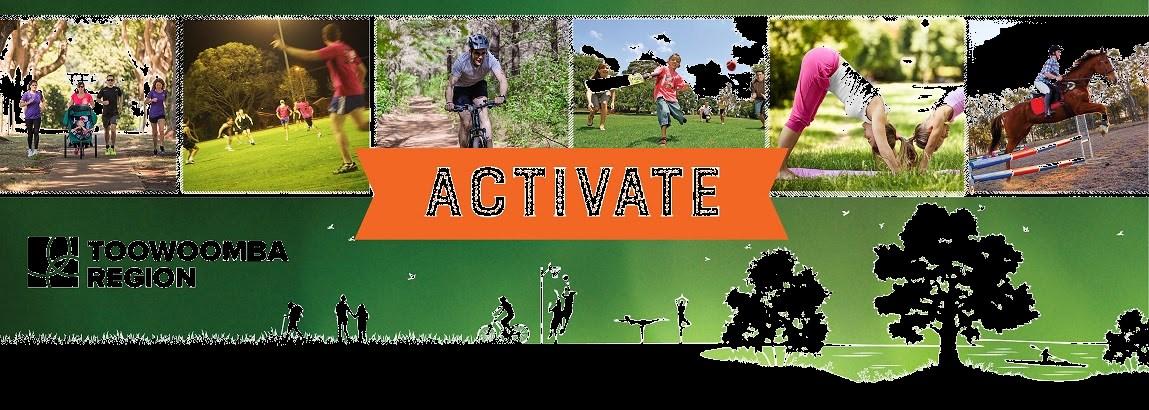
The Program is a volunteer program for young people aged 1424. This program allows young people from across the region to learn about local communities and groups, local events, activities, and services available for young people.
The Program started in 2015 and each year Youth Connect looks for 25 young people across the region to represent the voice of our region’s young people.
Members of the Program are provided opportunities to learn about Council processes and the role of local government. They are encouraged to have a say and devel-
www.whatsupindisability.org
op projects to create positive change, not only for the region’s young people but the wider community. TRC currently services a regional population of 173,000 (ABS, 2021), with about 30,000 of these residents being young people. Our Youth Leaders play an important part in ensuring that TRC programs are relevant, meet the needs of young people and have the greatest reach possible.
The Youth Leaders are required to identify and share information on community issues and opportunities for young people to connect to events, programs, and local service providers.
To contribute to the next edition please send your article to spaull@bigdogsupport.com.au by the 20th February/April/June/August/October/December or reserve your advertising or story


